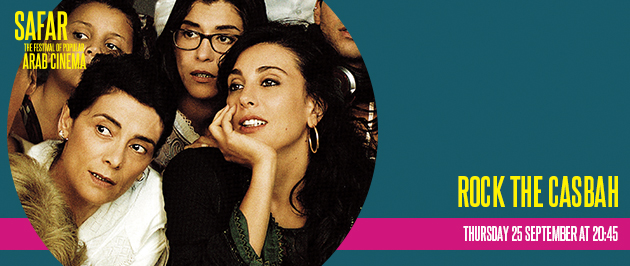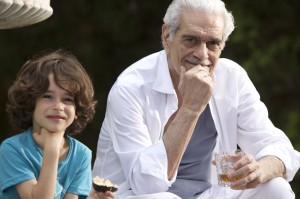Rock the Casbah
Directed by Laila Marrakchi
2013 | Morocco
In 2012, the Safar festival featured the first film that Omar Sharif starred in, The Beginning and the End (Bidaya wa nihaya, 1960). This year, Safar is closing with what could be perhaps his last. Rock the Casbah was a runaway success in Morocco after its release last year.
Directed by Laila Marrakchi, this feel good story about family secrets opens with Sharif playing the ghost of Moulay Hassan, a successful Moroccan industrialist and patriarch of an affluent family living in Tangier. Hassan/Sharif has a secret that doesn’t disappear with his death and comes to light as the family gathers for his funeral. It involves a thwarted love affair between his talented older daughter who committed suicide and the only son of the family’s beloved housekeeper.
Hassan’s three daughters are formidable and neurotic – Kenza (Lubna Azabal), a priggish school teacher who is religious and prone to breakdowns; the beer-drinking, straight talking Miriam (Nadine Labaki) recovering from a boob job; and the youngest, Sofia (Morjana Alaoui) who has returned to her country unannounced after working as an actress in the US, with the news that her own marriage to an American horror film director is on the rocks. She has in tow with her a precocious son, the only person in the film who can see the ghostly patriarch and converse with him. Hassan’s wife, Aicha (Hiam Abbass), keeps up family appearances yet feels the greatest grief. At the first chance she gets she dismisses the housekeeper, a seemingly traditional woman with discreet facial tattooing, Yacout (Fatima Harrandi aka Raouia) who is the emotional heart of the troubled family.
Rock the Casbah is a smart, knowing film about cinema and how the Middle East is often viewed. It begins in rollicking fashion, with Bing Crosby and Bob Hope’s song ‘Road to Morocco’, the theme tune from the eponymous 1942 Orientalist road romp that also starred Dorothy Lamour and a talking camel. Nor does Rock the Casbah shy away from more contemporary stereotypes. For instance, there is the actress Sofia forever typecast in the role of female terrorist in numerous American productions. Clips of her work are shown as part of Marrakchi’s film. Interestingly the referencing of a Clash song from 1982, the year of the Israel invasion of Lebanon, adds to a potent undermining of contemporary colonial imagination, and becomes a sly critique, even if delivered with tongue-in-cheek humour.
Sofia takes a break from mourning to go out into Tangiers’ seedy underworld with her elder’s sister’s tragic ex-boyfriend Zakaria, played by the Tunisian actor Adel Bencherif who is best known from the 2009 film A Prophet. After the suicide of Sophia’s eldest sister, the love of his life, he has become a sullen black marketer of pirate DVDs. During her trip Sophia appears caught in the turmoil of a failed homecoming, a claustrophobic family who still doesn’t understand her. Her memories of them ossified during the years she has been away.
 All the film’s women characters represent the country’s growing feminism, and provide glimpses of strength and self-knowledge in dealing with themselves and the men in their lives. Once the terrible secret of ghostly Hassan is exposed, the family starts the process of rebuilding and loving again. In the end, the women who shared Hassan and were living not as competitors but compatriots under the same roof are the film’s unsung heroes.
All the film’s women characters represent the country’s growing feminism, and provide glimpses of strength and self-knowledge in dealing with themselves and the men in their lives. Once the terrible secret of ghostly Hassan is exposed, the family starts the process of rebuilding and loving again. In the end, the women who shared Hassan and were living not as competitors but compatriots under the same roof are the film’s unsung heroes.
The director Laila Marrakchi is known for her highly praised film Marock (2005), which also marries contemporary Moroccan culture with the rock & roll lifestyles of a younger generation. Marock too tells the story of an illicit romance, in its case one between a Muslim girl and Jewish boy. Both films challenge assumptions about Islam while exploring class and gender tensions in Morocco. Let Bob, Bing and the tourists go to there for the pointy yellow leather slippers while the rest of us witness a country in transformation.
– Malu Halasa
London-based journalist writer and editor Malu Halasa is our writer-in-residence. Keep your eyes peeled for her posts in the run-up and during the festival.
For more information and to book tickets, please click here.


